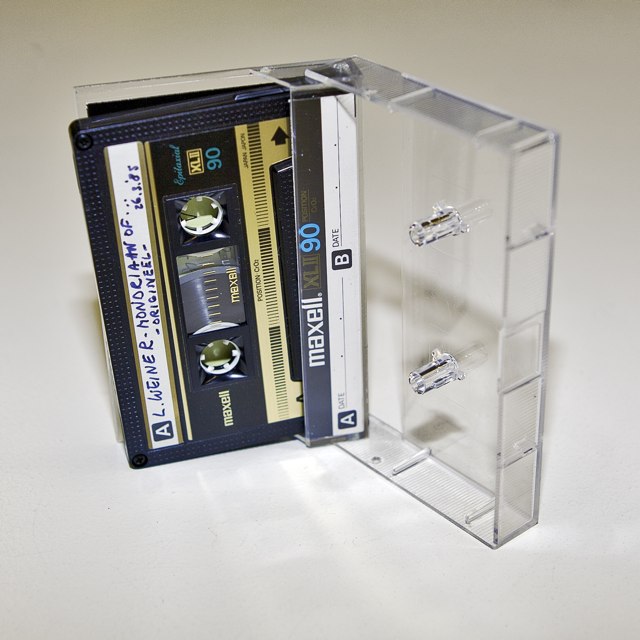Mondriaan of Volendam
26.03.1985
de Appel, Brouwersgracht 196, Amsterdam
de Appel, Brouwersgracht 196, Amsterdam
‘On 26 March 1985 at 8 pm, Hilversum I broadcast a programme by Lawrence Weiner as part of VPRO’s Het Evenement, produced by Wim Noordhoek. By taking listener phone calls and broadcasting statements on the visual arts, Lawrence Weiner invited the Dutch radio audience to participate in the programme Mondriaan or Volendam. Marianne Brouwer, curator at the Kröller-Müller Museum, and Paul Groot, general editor of the Museumjournaal, were also present in the studio to answer listeners’ questions. The wide variety of remarks and questions were alternated with texts and sound collages by Lawrence Weiner. [Below are a few fragments from Mondriaan or Volendam.]
Michael Gibbs: ‘I want to ask you some questions about the desires of the need of the present esthetic: what are the present needs of ‘a new esthetic’?’
Lawrence Weiner: ‘Needs of a new esthetic? To understand the situation as it stands for real with materials.’
MG: ‘And a further question: you spoke of art as being a service industry, is one of these services to be an effective form of opposition to certain aspects of that society?’
LW: ‘Absolutely and with the greatest quality that’s at all possible.’
MG: ‘And how does that tie with the increasing commodification of art within society?’
LW: ‘I think that the increasing commodification is just a reflection of the normal situation in the economy right now and has very little to do specifically with art; it has happened to everything; we cannot fight against that.’
MG: ‘You don’t see any way to fight against it.’
LW: ‘We can fight against it, but at this point I don’t have a solution. It is a difficult problem.’
Listener: Why do you use the expression 'longing for a new aesthetics' in that one text in Middelburg?
LW: ‘The new esthetic is not really a mode, but it’s a new understanding, after somebody makes a presentation that helps you to understand, you must go further….’
Listener: Why is art usually so expensive?
LW: Life is expensive, too, and you don’t have to pay for it if it’s hanging in a museum. Artists have to eat, too, don’t they? I really don’t think this is a question about art.
Listener: Why not, if I want to hang it in my house?
LW: You can borrow art in the Netherlands. That’s not expensive. And you can save up for it, too. Artists have to do that as well if they want to make something new. All my work, by the way, is printed in books that you can buy for 20 to 25 guilders apiece.
Listener: Why do you can your work 'sculptures' and not just paintings, poetry or philosophy of art?
LW: That’s not difficult to answer. It’s because they really are sculptures, because they suggest the relationship from object to object, and that is the idea and the intention of a sculpture. I don’t have anything against 'poetry', but it’s just resonance and tempo. Each of my works may be a poetic sculpture as well. I don’t think it’s a bad word, poetry, but I’m not a poet because poets concentrate on interpersonal relationships.
Listener: Can art heal?
LW: Sickness is not always physical. Art gives us some kind of insight into the relationship between people and objects. It can help if someone is completely afraid of life, but it cannot heal.’
Listener: ‘What I want to ask - referring to the previous gentleman - is, that I believe that art really can heal, as a matter of fact I am convinced of it for I see art as very spiritual. I do believe that one can really reach a certain level when one is creating.’
LW: ‘I don’t know. I hate to sound so cynical about it but art is really just a presentation of what people do when they work in relation to objects…. Yes a little knowledge can help you feel better about yourself. But that’s not the function of art. There’s a statement that comes up at one time: just because you're in the garage, doesn’t make you an automobile. Art functions as a metaphore and art functions as something that helps people to live better, but that’s not really its purpose and it’s almost like human beings function as soldiers or whores, but the definition of human being is not soldier or whore! So if art can help you to feel better about your situation, I don’t see any problem there, it is not misusing art. But there is a whole point that I think you’re missing in what constitutes art. Art really lets you understand your world rather than understand yourself.’
Luisteraar: ‘Do you believe that to be also the creator of art I mean….’
LW: ‘I prefer the word ‘maker’ as I said in the beginning of the program - ‘ik maak het’. I believe people make it, anybody could be an artist but it’s a ‘beslissing’, it’s a choice. If you chose to be an artist you do research and you do work into art. But I don’t think I create, it all was there before. I am a lucky person, I decided to be an artist at a certain age and I spent most of my time looking at the relation between myself and a piece of glass or the relation of myself and a colour.’’
(‘Mondriaan or Volendam’, De Appel, 5 (1985) 2, pp. 28, 29.)

